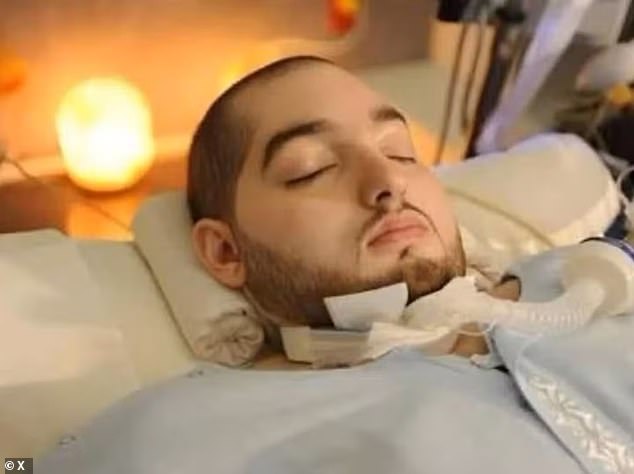Sad News: After 20 Years in a Coma, Saudi Arabian Prince Passes Away
On July 19, 2025, Saudi Arabia mourned the loss of Prince Al-Waleed bin Khaled bin Talal Al Saud, known as the “Sleeping Prince,” who passed away at the age of 36 after nearly two decades in a coma. The prince, a great-grandson of King Abdulaziz, the founder of modern Saudi Arabia, suffered severe brain injuries in a car accident in London in 2005, when he was just 15 years old. His death, announced by his father, Prince Khaled bin Talal, marked the end of a 20-year journey defined by hope, faith, and profound familial devotion. The tragedy has resonated deeply, sparking an outpouring of grief across the kingdom and beyond.
Born on April 18, 1990, Prince Al-Waleed was the eldest son of Prince Khaled bin Talal Al Saud and nephew of billionaire businessman Prince Alwaleed bin Talal. A promising student, he was studying at a military college in London when the devastating accident occurred. The 2005 crash left him with a severe brain hemorrhage and internal bleeding, plunging him into a vegetative state. He was airlifted to King Abdulaziz Medical City in Riyadh, where he remained on life support under constant medical supervision for nearly 20 years. Despite consultations with top specialists from the United States and Spain, the prince never regained full consciousness, though occasional minor movements—like lifting a finger or turning his head—offered fleeting hope to his family.
Prince Khaled, a prominent Saudi royal, refused to disconnect life support despite medical advice in 2015 to consider doing so. “If God had wanted him to die in the accident, he would have been in his grave now,” he reportedly said, reflecting his unwavering belief in divine will. His commitment turned Prince Al-Waleed’s hospital room into a site of quiet spiritual significance, with family members and religious figures gathering to recite Quranic verses, praying for a miracle.
Over the years, Prince Al-Waleed became a symbol of resilience and faith in Saudi Arabia and the broader Arab world. Known affectionately as “Dede” to his family, his story captured hearts far beyond the royal court. Social media posts from his father and aunt, Princess Rima bint Talal, often went viral, showing the prince in his hospital bed, sometimes draped in a Saudi flag or surrounded by decorations for Ramadan, Eid, or Saudi National Day. A 2019 video of him slightly moving his head sparked widespread optimism, with Princess Rima writing, “The Almighty, the Merciful… Al-Waleed is moving his head from side to side. Praise and thanks be to You, O Lord.”
The “Sleeping Prince” nickname reflected both his condition and the hope that he might one day awaken. In April 2025, as he turned 36, his story trended again on X, with users across the region offering prayers for his recovery. However, a misleading video that June falsely claimed he had awakened, showing rally driver Yazeed Mohamed Al-Rajhi instead, highlighted the challenges of misinformation surrounding his case. Fact-checkers, including NDTV and The Times of India, clarified that the prince remained in a coma, underscoring the need for verified reporting.

Prince Khaled announced his son’s passing on X, writing, “With hearts full of faith in Allah’s decree and destiny, and with profound sadness and sorrow, we mourn our beloved son Prince Al-Waleed bin Khaled bin Talal bin Abdulaziz Al Saud, may Allah have mercy on him, who passed away to Allah’s mercy today.” The announcement triggered a wave of condolences, with the hashtag “Sleeping Prince” trending across Saudi social media. “May his soul rest in complete peace,” one user wrote, while another noted, “Your time on this earth was a blessing to your family and the entire world.”
Funeral prayers were held on July 20, 2025, after the Asr prayer at Imam Turki bin Abdullah Mosque in Riyadh for men, and after the Dhuhr prayer at King Faisal Specialist Hospital for women. Mourning gatherings continued at the family’s Al-Fakhriyah palace until July 22, reflecting the royal family’s prominence and the public’s shared grief. The Global Imams Council expressed condolences, praising Prince Khaled’s “patience and steadfastness” as a testament to faith.
Prince Al-Waleed’s story raises profound questions about medical ethics, the limits of hope, and the emotional toll of prolonged coma care. His family’s decision to maintain life support for 20 years, despite minimal chances of recovery, sparked debates about quality of life versus faith-driven perseverance. While some admired Prince Khaled’s devotion, others questioned the resources devoted to a case with little prognosis for improvement. The case also highlighted advancements in long-term care, as surviving two decades in a vegetative state is rare, requiring extraordinary medical and familial commitment.
The incident that caused his coma—a traffic accident in London—also underscores the unpredictable risks faced by young people abroad. Prince Al-Waleed’s promising future as a military cadet was cut short, leaving a void in his family and community. His father’s refusal to give up, even in the face of medical advice, resonated with many who saw it as an act of love and faith, though it also fueled discussions about when to let go.
The death of the “Sleeping Prince” has left an indelible mark on Saudi Arabia. His story, shared through viral videos and heartfelt posts, humanized the royal family, showing their vulnerability and strength in the face of tragedy. As the kingdom reflects on his life, the focus shifts to lessons learned: the importance of road safety, the need for accurate reporting in the age of social media, and the enduring power of hope against overwhelming odds. Prince Al-Waleed’s 20-year struggle, though ending in sorrow, will be remembered as a testament to his family’s unwavering love and the collective prayers of a nation.







